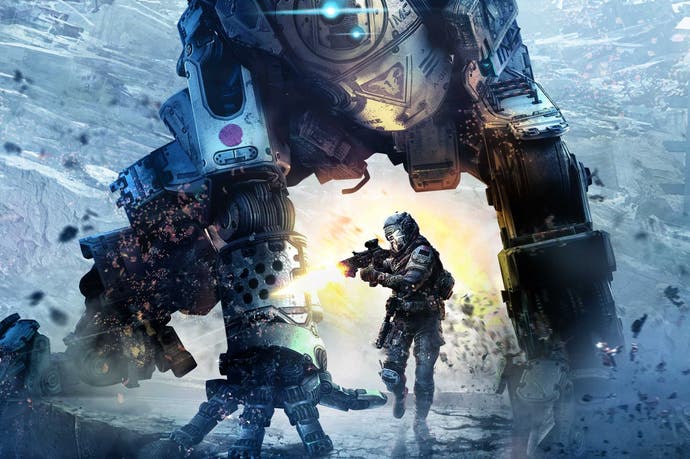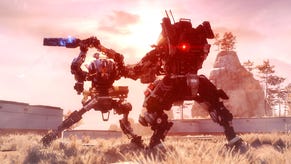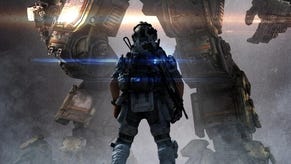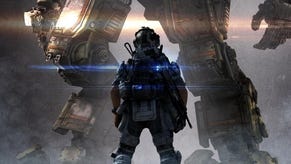Titanfall review
Final verdict from live servers.
Talk about pressure. The first game from a studio headed up by the co-creator of Call of Duty. The first big third-party exclusive of the new console generation. The game that arrives pre-anointed with 80 awards from journalists dazzled by trade show demonstrations. And all in a stifled genre crying out for a breath of fresh air. Yes, there's a lot riding on Titanfall's shoulders. Good thing those shoulders are made of reinforced steel.
The twist, of course, is that you're playing as an unusually athletic pilot on the space frontier, able to double-jump up to two stories high thanks to your jet-boosted belt and run along walls, mocking gravity as you go. You also have access to a Titan, a hulking armoured robot that turns you from vulnerable foot soldier to towering battlefield menace.
Peel apart Titanfall's suite of headline features and there's nothing technically new here. Mech suits and parkour are hardly unknown quantities in gaming, but what Respawn has done is to combine these elements - along with a generous spread of other intriguing concepts - with a simple, confident control scheme and a punchy style that not only revitalises these potentially tired ideas, but the first-person shooter genre itself.
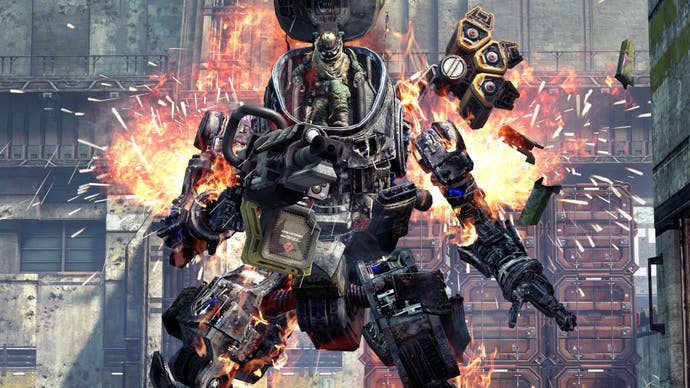
That freshness doesn't extend to the basic narrative set-up, sadly. Framed as a conflict between the ruthless military forces of the IMC and the ragged guerrilla upstarts of the Militia, the thin backdrop for Titanfall's action is as clichéd as it is shallow. There's a campaign mode of sorts, in which you play through nine matches as both factions, but it's an odd half-measure. The storyline is dull and obvious, with a turncoat defecting from the IMC to lead the Militia - and bolting audio cut-scenes onto otherwise normal multiplayer matches is a poor way of telling a story that's none too interesting to begin with.
"We're just not used to first-person shooters that play like this."
Better to head for the Classic playlists, where you'll find the real Titanfall experience, and it's surprisingly good. Surprising not because anyone really expected it to be bad, but because we're just not used to first-person shooters that play like this. Where the genre-topping likes of COD and Battlefield have doubled-down on their hardcore player base, Titanfall is a much more welcoming affair. The pace is a little less manic, newcomers will be able to survive for more than 30 seconds without being killed, and the game constantly goes out of its way to make sure that, win or lose, everyone gets to have fun.
This is most clearly illustrated in the Titans themselves. No matter how badly you play, you'll get to jump into a Titan eventually. It takes roughly three minutes for your Titan to be ready - summoned into battle with a satisfying thwump as it drops from the sky - but that build time can be sped up by good combat performance. Play well and you get the cool toys sooner, but even if you never even hit another player, you'll still get your time in the driver's seat.
In a way it feels wrong: an egalitarian approach that flies in the face of the unforgiving elitism that drives most shooters. Respawn has cannily designed the game, though, so that things which should utterly unbalance the match and remove skill from the equation actually do the opposite. Getting into a Titan is fun - literally, since the various animations for mounting up from different angles all look incredibly cool - but it's no guarantee of domination.
Titans are made to battle other Titans, and while they can crush players on foot (again, literally), the agility of the human characters makes that harder than it sounds. Add in a special inventory slot just for powerful Anti-Titan weapons, the ability to "rodeo" on Titans and demolish them with close-quarters fire and the verticality of maps which allow pilots to hop around like fleas to find better vantage points, and you've got a seemingly chaotic system that actually works like clockwork. Returning to existing shooters after time spent on Titanfall can be jarring - they feel leaden and limiting, and you'll yearn to be able to leap to rooftops and stomp down streets once more.
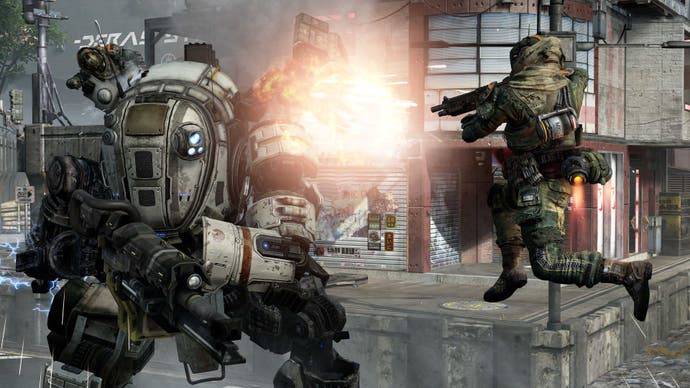
You can even have the best of both worlds thanks to the Titan AI mode. Once it has dropped, you don't have to control the Titan yourself; set it to Guard or Follow mode and it'll act autonomously, gaining kills and XP on your behalf. You quickly learn that the secret to success is to swap between the two frequently, essentially operating as two distinct units at the same time.
Related to this are the AI bots which round out the matches. With only 12 players per match, it's tempting to see this as a way of making up the numbers, but these drone fighters prove to be more than that. They're a third tier of combatant, mostly dim, unlikely to do any real damage and unable to swing the direction of a match, but they act as battlefield markers that skilled pilots can quickly read. Follow the drones and you'll find the heat of the action. That they also offer small scoring opportunities and reasonably useful back-up is just gravy. Crucially, they offer easy cannon fodder for new players, breaking that dispiriting cycle of respawn-death-respawn that comes from player-only deathmatches. Every player can feel like they're doing something useful, something fun, even if they're actually getting creamed.
It's a sharp change of direction for developers who previously skewed the genre by introducing Modern Warfare's controversial Perk and Killstreak systems - and the equivalent here marks the difference neatly. Burn Cards aren't earned for just killing other players, but handed out generously for meeting all sorts of criteria in almost 1000 ongoing ambient stats challenges. You can equip up to three cards per match, and opt to use one before a round starts. You may get a more powerful weapon, a souped-up ability or a reduction in the countdown for your Titan. What matters is that each card is a single-use item and is lost at the end of the match or when you die, whichever comes first. In other words, they offer a useful advantage, but only for a short time. The days of the best players getting permanent boosts that keep them at the top are gone.
Titanfall's action is as muscular and thrilling as you'd expect, given Respawn's pedigree, but it's this new attitude towards player balance that makes it stand out. Skill is still rewarded, but lack of skill isn't so harshly punished. Witness the adrenalin rush of ejecting from a doomed Titan and soaring into the air for a bird's eye view of the battlefield that allows you to drop back into action with a tactical advantage. Better still is the idea of evacuation, a stroke of match design genius that ends every round not with a hard cut to the leaderboard but with an extra-time, no-respawns scramble to an exit point.
Those on the losing team have to reach a dropship before it escapes; the winners must stop them. It's a small and simple tweak, but one that offers just enough of a second chance, and a team-based narrative, to take the personal sting out of defeat. Many's the time you'll lose a match but emerge feeling victorious because you made it to the dropship unscathed. It's this willingness to make even losing fun that sets Titanfall apart, and suggests a more inclusive future for the FPS genre.
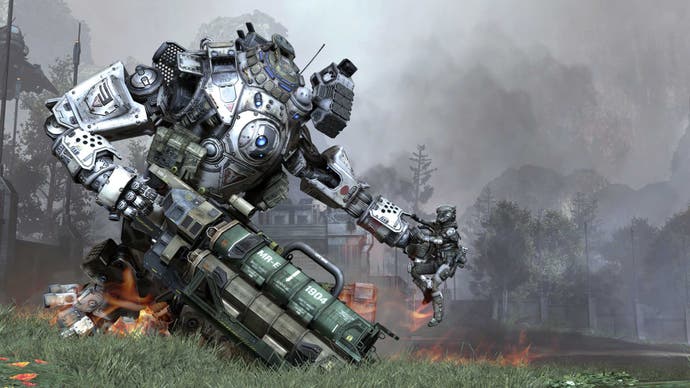
Not all of the concessions to more inviting play are as well considered, however. The auto-targetting Smart Pistol is another fine example of how an apparently game-breaking idea can actually enhance the experience. It's powerful, but never too powerful, and as you unlock more weapons you'll naturally gravitate away from it. It's just a shame that the weapons that follow are never as interesting or imaginative. Assault rifles, SMGs, shotguns and sniper rifles - there are few surprises, and even the anti-Titan weapons are sensibly effective rather than memorable and exciting. It's all disappointingly vanilla-flavoured after the Smart Pistol, which stands alone in the arsenal as a weapon with unique gameplay intent behind it. It's as if the team behind Insomniac's inventively armed Resistance series popped in, designed one weapon, then left.
Weaponry is one area where it feels like Respawn wasn't quite ready to let go of its Infinity Ward heritage; the other is the game modes themselves. Despite gameplay systems that shake up FPS tropes in enjoyable new ways, the fact that you're limited to five overly familiar play styles can't help but eat away at Titanfall's long-term appeal. Hardpoint Domination and Attrition are the main two, the only ones used in the so-called campaign matches, and they're predictable enough. Attrition is Team Deathmatch by any other name, while Hardpoint Domination is a base capture mode with three holding points per map. The latter shows Titanfall at its strongest, demanding solid offensive and defensive play across the whole of the map.
There's also Pilot Hunter, in which points are only scored by killing pilots not demolishing Titans, and the flipside to that is Last Titan Standing, in which every player starts in a Titan but there are no respawns. As the name suggests, the first team to run out of Titans loses. Neither mode is particularly satisfying, though Last Titan Standing has a certain pugnacious charm as it often descends into short, brutal slugfests. The trouble is that Titanfall's appeal comes from the way its ideas are intertwined, so modes that force players to focus on one aspect over another are inevitably weakened. That only leaves Capture The Flag, a standard inclusion that isn't elevated enough by Titanfall's best ideas. CTF matches too often end in stalemate, and while the maps offer some interesting routes for parkour escapes, it's the least satisfying way to play.
While these rather tired old modes are initially refreshed by Titanfall's reconstructed approach to FPS pacing and balance, it's not quite enough to sustain it. There's a plateau somewhere around level 25 where the rate of unlocks slows down, the matches start to fall into repetition, and the accumulation of XP, generous as it is, begins to feel the drag of the grind. What's missing is a mode that could only be done in this game - something that redefines the shooter on Titanfall's terms.
Map design is solid, if short on memorable features. Mostly, it's the same balancing act that impresses: the way that a map takes on completely different aspects from a Titan cockpit than it does from the ground. It's a different style of map-making from that practised on the Modern Warfare series, where constant, restless and relentless motion is the driving force. Titanfall maps have more corners and dead ends, more strange angles, than the frictionless ice rinks of COD.
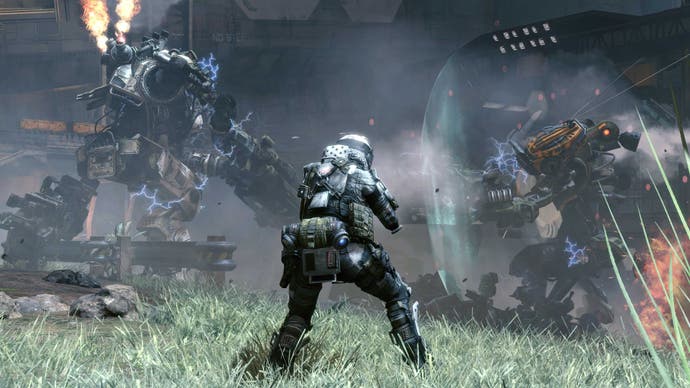
The naming conventions, at least, hark back to Respawn's past with curt, even blunt, one-word titles such as Lagoon, Fracture and Corporate the norm. The latter is one of the best examples of how the game juggles tense, intimate, interior conflicts with larger-scale, Titan-fuelled bombast. Set in a robotics factory, the map has wide, sweeping exteriors, an enclosed courtyard, tangles of interior rooms offering multiple vantage points and - crucially - lots of rooftops and elevated walkways. The flow is different to COD's as you segue between slower-paced, pounding Titan encounters and fast and nasty quick-draw scenarios, before taking to the higher ground to survey the situation and maybe pull off some long-distance kills.
Navigating these spaces is a constant pleasure, as you piggyback on enemy Titans and spring off again as they explode, using them as stepping stones to otherwise unreachable spots. It's not just that the game lets you do this sort of thing, but that it feels so effortless in execution. It's like playing first-person Crackdown - a game where you almost can't help but do cool stuff.
"Respawn has shaken up the FPS just as surely as Infinity Ward did with Modern Warfare, and any one of Titanfall's ideas would be a fine starting point for a new era in shooter design."
Is Titanfall the next-gen showcase we've been waiting for? In pure gameplay terms, it's hard to argue otherwise. Respawn has shaken up the FPS just as surely as Infinity Ward did with the original Modern Warfare, and any one of Titanfall's ideas would be a fine starting point for a new era in shooter design. That it boasts several such ideas speaks highly of the studio's desire to break the repetition that has taken root in recent years.
Structurally is where Titanfall shows its limitations, and the reliance on the same old standard match types feels like a concession to the restrictions the rest of the game kicks against. Technically, too, it's not quite the polished gem some may be expecting. Textures don't always impress when wall-running brings you close to them, and the frame rate can still chug when the action gets intense. There's noticeable screen tearing and load times can be a chore. Character models and animations don't always stand up to much scrutiny either. None of this is particularly harmful, but it does take the shine off what many will expect to be a pristine, console-justifying experience.
It all comes back to the gameplay though, and it's here that Titanfall stamps its identity most firmly. It's no secret that first-person shooters are in a comfortable rut, and Titanfall shakes things up perfectly - not just in terms of design, but more crucially, in how these games relate to their audience. With almost no blood and only mild swearing, the game's accessible nature is a door thrown open to everyone who has steered clear of the bullish, hyper-macho military shooters that have come to dominate the scene.
In fact, Titanfall gets so much right that it's easy to start taking it for granted, as game-changing ideas become second nature so quickly and so easily. Titanfall's moment-to-moment gameplay is fantastic, but it's the things that are missing that hold it back from being truly excellent. The technical rough edges are disappointing, but not distractingly so. Harder to ignore are the limited and repetitive game modes and a general lack of options for refining the matchmaking.
There are no private lobbies, nor any opportunity to vote on the next map or mode. Getting into a game is slick and easy, but the downside is that you end up taking what you're given. Matchmaking, too, needs work: lobbies tend to go out of balance during prolonged sessions as players drop out and teams are repopulated in odd ways. It's not unusual to see one team with multiple high-level players pitted against a team whose highest ranked player is in the mid-teens. The good news is that Respawn is aware of, and reacting to, these issues. With the right updates and additions, Titanfall could easily become the shooter of choice for the new console generation. For now, it's muscular and entertaining, but limited in scope.
In its current form, then, Titanfall is perhaps more of a step forward for shooters than a giant leap. But that still represents the most positive momentum seen in the genre for at least five years. Quite simply, if you feel like you're in danger of falling out of love with multiplayer shooters, Titanfall is the game to win you back.
This review was originally published as a launch review on 10th March, meaning we played the game in controlled conditions and withheld a score until we could test it on live servers. After playing during both the North American and European launches, we added live game impressions, tweaked the conclusion and added a score on 17th March.
